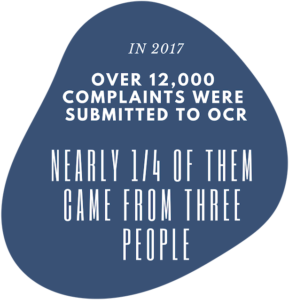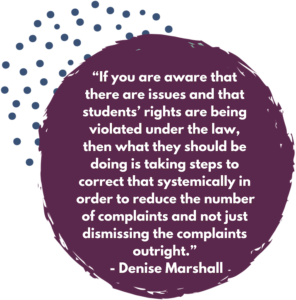OCR CPM Updates: No Longer Dismissing Repeat Complaints by Filers
Updated: June 3, 2019
Several months after a controversial provision was made encouraging investigators to dismiss multiple civil rights complaints from the same source, the U.S. Department of Education’s Office for Civil Rights (OCR) has announced plans to reverse this provision.
The background: OCR Revision

In 2017, over 12,000 complaints were submitted to the OCR — almost a quarter of them came from three people. The policy is said to target these numerous complaints for similar violations. Many individuals were strongly against this policy, as a great number of similar cases should not diminish the legitimacy of each individual case, but rather points to a larger issue. Civil rights advocates fear that the outright rejection of numerous legitimate claims could be extremely harmful for protecting the civil rights of those with disabilities. Just a month after its implementation, the new provision had already resulted in the dismissal of more than 500 disability rights complaints.
The OCR is responsible for enforcing laws such as the Americans with Disabilities Act and Section 504 of the Rehabilitation Act of 1973, both of which prohibit public entities from discriminating against individuals based on disability. It also enforces Title IX, which prohibits discrimination based on sex, and other laws that prohibit discrimination based on age, race, color, or national origin. The move away from systemic investigations was very jarring for parents, and advocates, and sets a scary and dangerous precedent.
Shortly after the OCR announced the change, the Council for Parent Advocates and Attorneys, the NAACP, and the National Federation of the Blind filed a complaint in federal district court saying the department’s decision to ignore consecutive complaints ran counter to the department’s greater mission.
The update: OCR to Reverse Controversial March Provision
On November 20, 2018, the U.S. Department of Education’s Office for Civil Rights (OCR) announced its plans to reverse the controversial provision made in March, outlining several key changes to how it investigates civil rights claims. Specifically, the department announced it will be revising the OCR’s case-processing manual—which guides how cases are handled. The update will eliminate section 108(t) which will remove the language that called for investigators to dismiss multiple complaints originating from the same source. Additionally, the OCR will conduct investigations of complaints that were previously dismissed under the March rule change. This means that not only will the repeal undoubtedly result in a significant increase in the number of new investigations against educational institutions for inaccessible websites and digital content, but hundreds of formerly closed cases will be reopened as well.
Institutions should be prepared for this increase of web access complaints. If your school’s website isn’t accessible, then it is at risk of an OCR complaint.
—
Watch the 2018 Legal Update on Digital Access Cases with Lainey Feingold to learn more about the legal landscape of accessibility in the United States.
Further Reading

Subscribe to the Blog Digest
Sign up to receive our blog digest and other information on this topic. You can unsubscribe anytime.
By subscribing you agree to our privacy policy.






